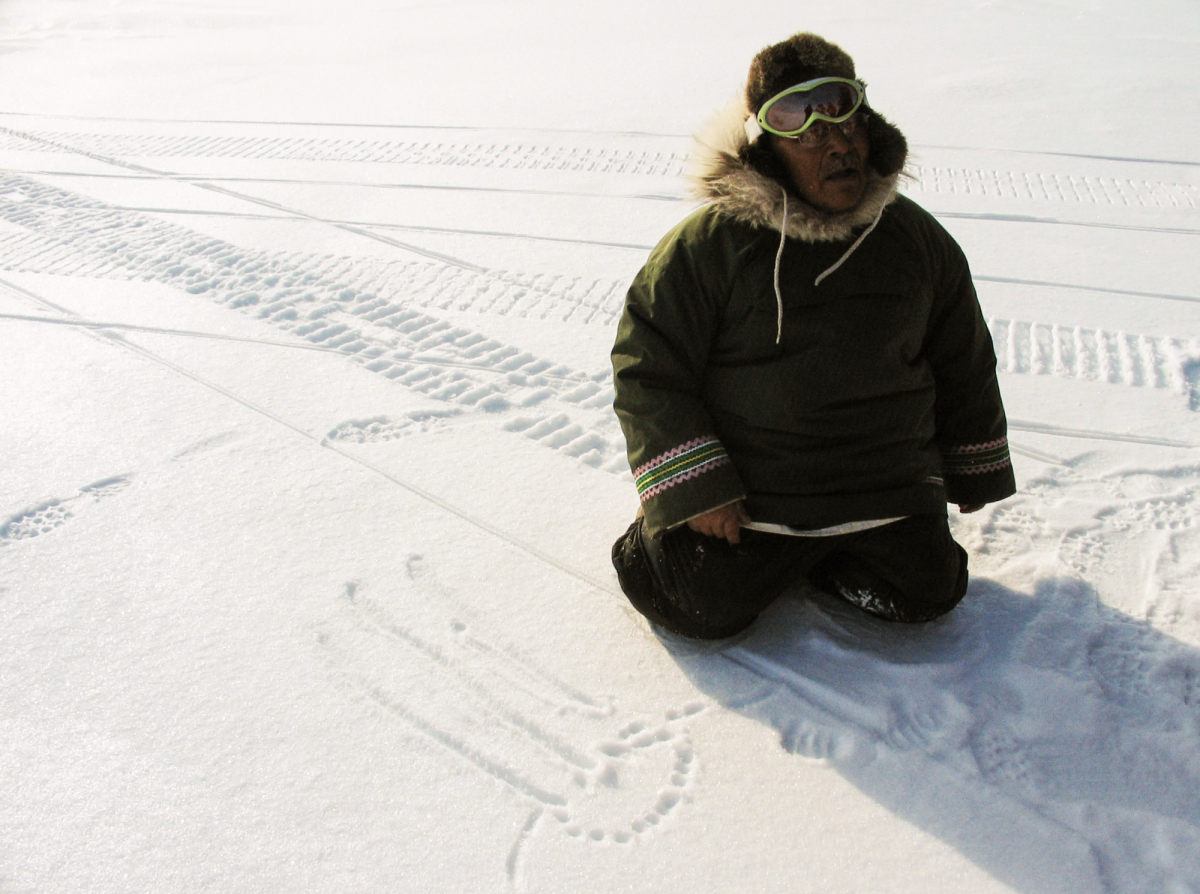
Barthelemy Nirlungayuk from Kuugaaruk, Nunavut explaining that there is a fish weir - a traditional fish harvesting site - under the ice were the photo was taken. The drawing in the snow illustrates the weir and how it works. Photo: Nunavut Parks/C.Grosset
Designing Pathways
Informing Indigenous Planning and Design within the University of Manitoba's Faculty of Architecture and beyond
Date: Friday, January 17, 2020
Time: 12:00PM
Location: Centre Space, John A. Russell Building
Designing Pathways is an interdisciplinary panel discussion that will explore some lessons learned in the area of Indigenous Planning and Design. Following the release of the Truth and Reconciliation Commission Calls to Action in 2015, each of the professional organizations (CSLA, RIAC and CIP) have made commitments to Reconciliation through establishing committees and devising action plans. The purpose of this panel discussion is to hear the perspectives of four practitioners from the fields of architecture, landscape architecture, planning and interior design. The discussion will focus on the development of informed practical skills including research, engagement, planning and design. Panelists will share their experiences, provide advise to students/faculty members and describe hopes for the future of their professions.
In Fall 2019, the Indigenous Design and Planning Student Association (IDPSA) was founded in the Faculty of Architecture. This initiative was met with support from the Faculty of Architecture Student Association (FASA) and the Office of the Dean.
Panelists:
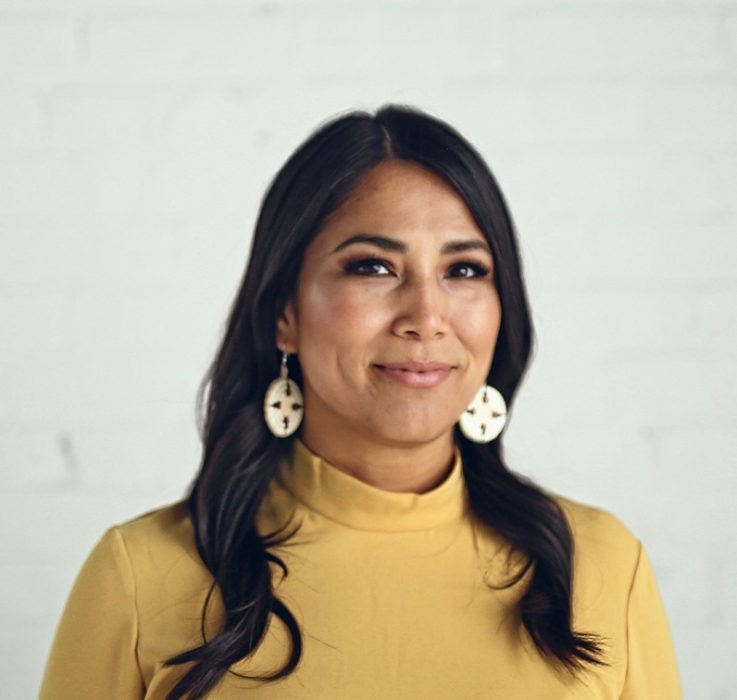
Panelist: Destiny Seymour
Destiny Seymour is an Anishinaabe interior designer based in Winnipeg, Manitoba. Destiny graduated with her Masters in Interior Design from the University of Manitoba. She worked at a local architecture firm in Winnipeg for over 10 years as their interior designer before starting her own design business in 2016. Destiny started designing artisan textiles for interiors that respectfully reflects local Manitoban Indigenous peoples and their history after struggling to find materials that she could incorporate into design projects. For thousands of years, Indigenous peoples in Manitoba created beautiful patterns to adorn their pottery and host of bone tools. Most of these surviving pieces are held in museums now. Using a variety of materials & mediums, Destiny is reviving these ancient patterns to provoke thought, inspire, and empower. Her company, Indigo Arrows, now offers a range of table linens, pillows, and blankets that showcase patterns from local Indigenous pottery and bone tools that date from 400 to over 3000 years old.
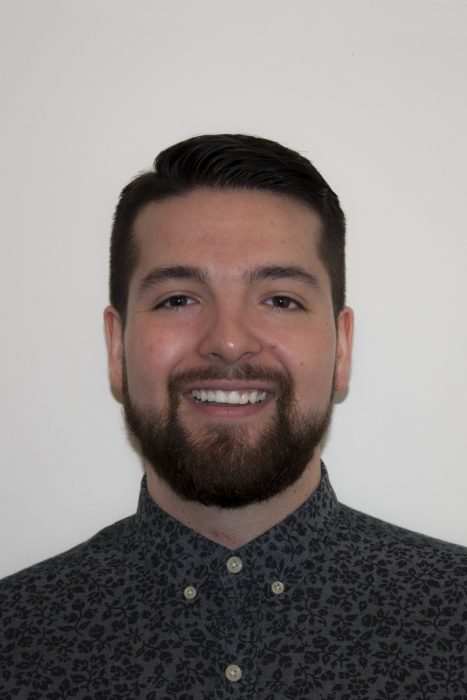
Panelist: Grant Falgren
Grant Falgren is a member of Wabigoon Lake Ojibway Nation, a founding member of the Canadian Society for Landscape Architect’s (CSLA) Reconciliation Advisory Committee, and a Project Designer at PFS Studio where he works closely with indigenous collaborators on planning and design projects. He graduated from the University of Manitoba with a Bachelor of Environmental Design and received his Masters in Landscape Architecture at the School of Architecture and Landscape Architecture at the University of British Columbia, where his thesis research focused on the potential of traditional knowledge to mitigate impacts of sea-level rise. In 2015 Grant was named the National Olmsted Scholar by the Landscape Architecture Foundation, the premier award for landscape architecture students in North America. His work with the CSLA Reconciliation Advisory Committee is intended to build the collective capacity of landscape architects across the country to collaborate with indigenous communities. In support of these efforts, Grant was a member of the planning committee of the 2019 CSLA Congress in Vancouver as well as the guest editor for Landscapes Paysages magazine Fall 2019 issue, both focusing on the role of landscape architecture in reconciliation.
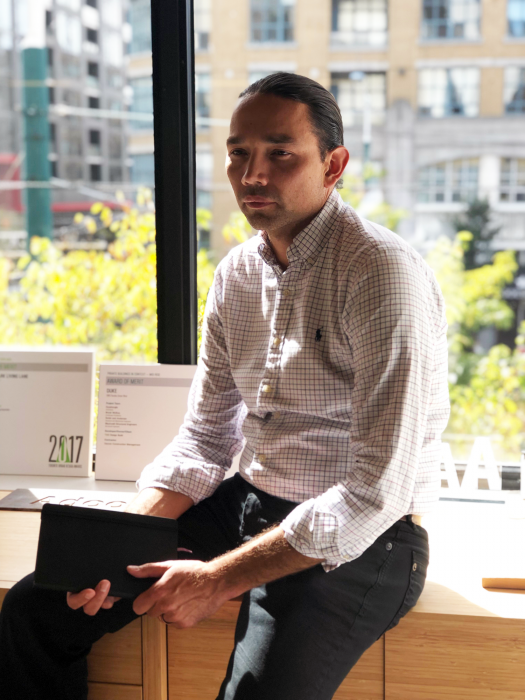
Panelist: Ryan Gorrie
Ryan Gorrie has been collaborating with Brook McIlroy since 2009, when he was retained as a key member of the design team for the award-winning Spirit Garden in Thunder Bay, and formally joined the firm in 2016 to lead the Indigenous Design Studio. Ryan is a member of Bingwi Neyaashi Anishinaabek (Sand Point First Nation on Lake Nipigon) and strives to ensure the perpetuation of Indigenous culture through creative opportunities ranging from the crafting of traditional items for ceremonial use to large-scale landmark architecture. He is a licensed architect in Manitoba. In 2018, Ryan’s work was showcased in UNCEDED: Voices of the Land at the Venice Biennale along with the work of 17 other Indigenous architects and designers across Turtle Island. His work has been recognized with awards from professional bodies including the Ontario Association of Architects, Royal Architectural Institute of Canada, and Ontario Wood Works. As part of a broader effort to support Indigenous presence in the design industry, Ryan has helped Brook McIlroy to source Indigenous suppliers for inclusion in projects. He also provides mentorship for Indigenous students and young designers who work at the firm.
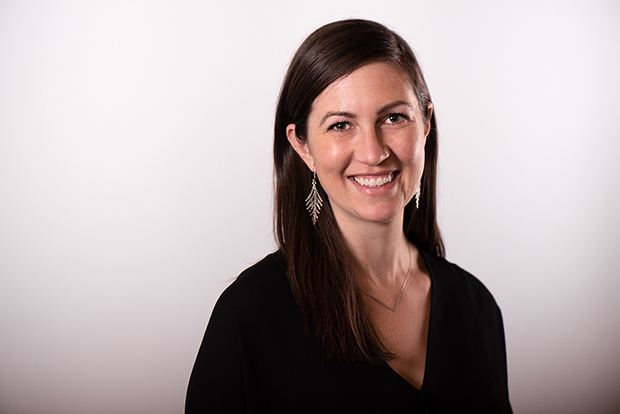
Panelist: Zoë Mager
Zoë Mager is a community planner, whose professional focus includes environmental conservation, sustainable urban design, housing, land use planning, equity and accessibility, youth engagement, and systems-change processes. Zoë has considerable experience working with and for Indigenous communities on consultation, traditional knowledge, ecosystem management, and community and environmental planning processes. She is also committed to life-long learning about urban agriculture, permaculture design, herbal medicine, music and craft, and likes to spy on birds. Zoë has a Masters of Environmental Studies (Planning) from York University and a BA in Indigenous Environmental Studies from Trent University.
Moderated By:
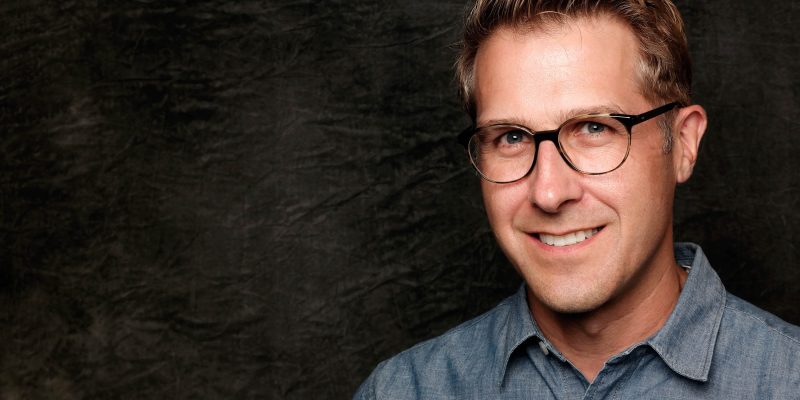
Chris Grosset
Chris Grosset has specialized in landscape planning and design projects across the Canadian arctic that support Indigenous land use, socio-economic development, and heritage conservation for over two decades. His practice integrates Indigenous traditional knowledge with landscape architecture approaches for protected areas and heritage sites. He earned a Bachelor of Arts from the University of Toronto in 1993 and a Master of Landscape Architecture from the University of Guelph in 2000. He’s a Fellow of the Canadian Society of Landscape Architects, President of the Nunavut Association of Landscape Architects, and a member of the Northwest Territories Association of Landscape Architects and Canadian Association of Heritage Professionals. Since 2016, Chris has Chaired the Canadian Society of Landscape Architects Reconciliation Advisory Committee, mandated “to guide the CSLA in improving awareness and capacity for supporting Canada’s First Nations, Inuit, and Métis Peoples”.






